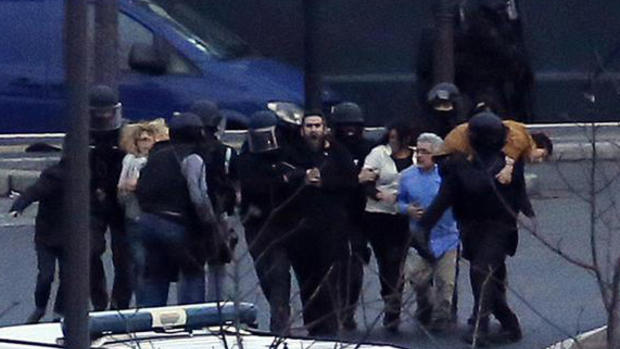What do we know about slain Paris terror suspects?
The two brothers suspected of staging a murderous rampage at a Paris newspaper and later killed during a standoff at a suburban printing plant had ties to the man who was killed along with four of his hostages after seizing a kosher supermarket in the French capital.
Said and Cherif Kouachi, the brothers accused of attacking Charlie Hebdo on Wednesday, were killed after an all-day hostage siege at a printing plant northeast of Paris, officials said. Their lone hostage was freed, authorities said.
Meanwhile their apparent associate, Amedi Coulibaly, took more than a dozen hostages Friday afternoon at a kosher grocery in Paris - then died in a nearly simultaneous raid there. Four hostages were killed and 16 people were rescued from the Porte de Vincennes grocery store.
The four attackers had ties to each other and to terrorism that reached back years and extended from Paris to al Qaeda in Yemen, also known as al Qaeda in the Arabian Peninsula, or AQAP.
On Friday, a member of al Qaeda's branch in Yemen said the group directed the attack on Charlie Hebdo "as revenge for the honor" of Islam's Prophet Muhammad. The member on Friday provided to CBS News a statement in English saying "the leadership of AQAP directed the operations and they have chosen their target carefully."
The attackers epitomized Western authorities' greatest fear: Islamic radicals who trained abroad and came home to stage attacks.
CBS News correspondent Bob Orr reports that the three were connected to the same jihadi circle that was trying to recruit fighters to send to Iraq in the 2000s. It is unclear whether the attacks were part of an orchestrated campaign but they "did run in the same circles," Orr said.
Police say Coulibaly and the Kouachi brothers, the Paris-born sons of Algerian parents, were all members of the same Islamist cell in northern Paris, Reuters reported.
Minutes before the storming, Coulibaly had threatened to kill hostages if French authorities launched an assault on the two brothers, a police official said.
Cherif Kouachi's arrest in 2008 for recruiting fighters in France to travel to Iraq made him the more well-known of the two brothers, but his older brother Said may actually have had stronger ties to al Qaeda terrorists, CBS News' Bob Orr reported Thursday.
U.S. sources said French investigators have evidence Said traveled to Yemen in 2011 and linked up with AQAP, the terror network's affiliate based in the country. CBS News has been told Said "spent several months" in Yemen training with AQAP.
Multiple witnesses to the attack on Charlie Hebdo's office, and the man who had his car stolen by the brothers Friday morning, said the men had claimed an affiliation with AQAP.
During Said's time in Yemen, AQAP's terror operations were being run by the U.S.-born radical cleric Anwar al-Awlaki.
A man purporting to be Cherif Kouachi told a French TV station by phone Friday that he was financed by al-Awlaki. U.S. officials considered al-Awlaki, who was killed in a U.S. drone strike in September 2011, to be an inspirational leader of al Qaeda.
The man claiming to be Cherif Kouachi made the comments to BFM-TV, according to a recording aired by the TV channel after the Kouachi brothers were killed by French security forces.
Orr reports that the link to Awlaki cannot be verified but it is plausible because Said Kouachi spent time in Yemen in 2011, which would have put him there at the same time as Awlaki.
Awlaki was the inspiration behind Nidal Hassan's massacre at Fort Hood. Awlaki also led the failed attempts to hit the U.S. with bombs smuggled onto jetliners inside underwear and computer printers.
A man claiming to be Coulibaly later called the same TV station, pledging allegiance to the Islamic State of Iraq and Syria (ISIS). He said he had "synchronized" the attacks with the Kouachi brothers.
Intelligence analysts in the United States are scrubbing files and old intelligence information to search for any connection between the Paris terrorist suspects and anyone in the U.S., CBS News has learned. Orr reported that that the two brothers at the heart of the manhunt had been on the U.S. no-fly list.
The FBI Friday sent out an intelligence bulletin reminding U.S. law enforcement partners to be aware of the potential for homeland attacks carried out by sympathizers or followers of radical Islamic groups.
The alert primarily features an update and analysis of the recent attacks in Paris. Officials say there is no credible information suggesting that any U.S. attack is imminent, but the bulletin says it is important for police and the public to remain vigilant.
Sources say U.S. law enforcement and intelligence analysis have found nothing connecting the three dead French terror suspects to any threat or co-conspirators in the U.S.
French authorities are still searching for Coulibaly's girlfriend, Hayet Boumddiene, who was reportedly seen as recently as Friday morning with him.
Cherif Kouachi, a former pizza deliveryman, had appeared in a 2005 French TV documentary on Islamic extremism and was sentenced to 18 months in prison in 2008 for trying to join up with fighters battling in Iraq.
It was the teachings of a firebrand Muslim preacher that put him on the path to jihad in his rough-and-tumble neighborhood of northeastern Paris, Kouachi was quoted as saying in the documentary.
The cleric "told me that (holy) texts prove the benefits of suicide attacks," Kouachi was quoted as saying. "It's written in the texts that it's good to die as a martyr."
